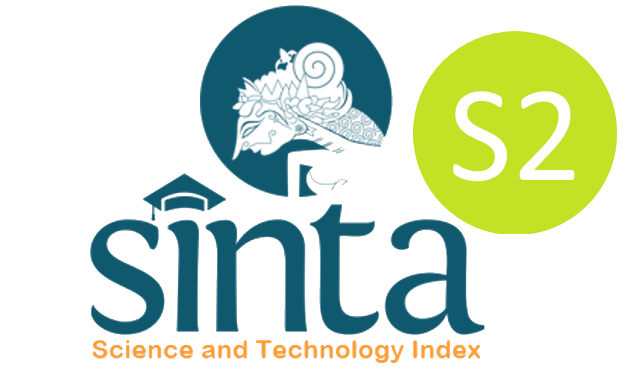Abstract
Distance learning as an impact of COVID-19 pandemic becomes a challenge for teacher effectiveness. The current study examined the role of psychological capital as a mediator of the relationship between openness to experience and teacher effectiveness. This study involved 172 senior high school teachers in Jabodetabek as respondents who are currently conducting distance learning. Respondents are 117 female teachers (68%) and 55 male teachers (32%) who have teaching experience in the range of 5 months to 35 years (M = 161.34, SD = 121.8). The mediation analysis results revealed a significant indirect effect between openness to experience and teacher effectiveness through psychological capital, 𝛽 = .999, p < .01, 95% CI [.668, 1.369]. These findings prove that psychological capital mediates the relationship between openness to experience and teacher effectiveness. Therefore, teachers should have high openness to experience to increase psychological capital so teacher effectiveness will also increase.
References
Adov, L., & Mäeots, M. (2021). What Can We Learn about Science Teachers’ Technology Use during the COVID-19 Pandemic?. Education Sciences, 11(6), 255. https://doi.org/10.3390/educsci11060255
Asselmann, E., Borghans, L., Montizaan, R., & Seegers, P. (2020). The role of personality in the thoughts, feelings, and behaviors of students in Germany during the first weeks of the COVID-19 pandemic. PloS one, 15(11), e0242904. https://doi.org/10.1371/journal.pone.0242904
Atsani, K. H. L. G. M. Z. (2020). Transformasi media pembelajaran pada masa pandemi COVID-19. Al-Hikmah: Jurnal Studi Islam, 1(1), 82-93.
Avey, J. B. (2014). The left side of psychological capital: New evidence on the antecedents of PsyCap. Journal of Leadership & Organizational Studies, 21(2), 141-149. doi:10.1177/1548051813515516
Bardach, L., Klassen, R. M., & Perry, N. E. (2021). Teachers’ psychological characteristics: Do they matter for teacher effectiveness, teachers’ well-being, retention, and interpersonal relations? An integrative review. Educational Psychology Review, 1-42. https://doi.org/10.1007/s10648-021-09614-9
Bozgeyikli, H. (2017). Big Five Personality Traits as the Predictor of Teachers' Organizational Psychological Capital. Online Submission, 8(18), 125-135.
Buela, S., & Joseph, M. C. (2015). Relationship between personality and teacher effectiveness of high school teachers. The International Journal of Indian Psychology, 3(1), 57-70.
Bullough, R. V. (2019). Getting Motivation Right: The Call to Teach and Teacher Hopefulness. In Essays on Teaching Education and the Inner Drama of Teaching. Emerald Publishing Limited.
Chang, M. L., & Taxer, J. (2020). Teacher emotion regulation strategies in response to classroom misbehavior. Teachers and Teaching, 1-17. https://doi.org/10.1080/13540602.2020.1740198
Chen, H., Liu, F., Pang, L., Liu, F., Fang, T., Wen, Y., ... & Gu, X. (2020). Are you tired of working amid the pandemic? The role of professional identity and job satisfaction against job burnout. International journal of environmental research and public health, 17(24), 9188.
Cokluk, O. (2014). Orgutlerde tukenmislik. Icinde C. Elma ve K. Demir (Ed.) [Burnout in organizations]. In C. Elma & K. Demir (Ed.), Yonetimde cagdas yaklasimlar uygulamalar ve sorunlar [Modern approachments practises and problems in administration] (pp. 117-143). Ankara: Ani Yayincilik.
Collie, R. J., Martin, A. J., & Granziera, H. (2018). Being able to adapt in the classroom improves teachers’ well-being. https://theconversation.com/being-able-to-adapt-in-the-classroom-improves-teachers-well-being-95788
Costa, P. T., & McCrae, R. R. (2008). The five-factor theory of personality. In Handbook of personality: Theory and research. Guilford Press.
Dewal, K., & Kumar, S. (2017). The mediating role of psychological capital in the relationship between big five personality traits and psychological well-being: A study of Indian entrepreneurs. Indian Journal of Positive Psychology, 8(4), 500-506.
Dunning, D. (2011). The Dunning–Kruger effect: On being ignorant of one's own ignorance. In Advances in experimental social psychology (Vol. 44, pp. 247-296). Academic Press.
Efriana, L. (2021). Problems of Online Learning during Covid-19 Pandemic in EFL Classroom and the Solution. JELITA, 38-47.
Emmanuel, N. (2020). The impact of psychological capital on teaching effectiveness in the Bafut Sub-Division. International Journal of Trend in Scientific Research and Development (IJTSRD), 4(6), 1781-1801.
Ferradás, M. D. M., Freire, C., García-Bértoa, A., Núñez, J. C., & Rodríguez, S. (2019). Teacher profiles of psychological capital and their relationship with burnout. Sustainability, 11(18), 5096.
Fisher, C. (2021). Student and Teacher Relationships at Secondary Level (Doctoral dissertation, University of Northern Colorado).
Goel, D., & Barooah, B. (2018). Drivers of student performance: Evidence from higher secondary public schools in Delhi. GLO Discussion Paper, 231.
Gravetter, F. J., & Forzano, L. B. (2019). Research Methods for The Behavioral Sciences (6th ed.). Cengage Learning.
Grover, S. L., Teo, S. T., Pick, D., Roche, M., & Newton, C. J. (2018). Psychological capital as a personal resource in the JD-R model. Personnel Review, 47(4), 968-984. https://doi.org/10.37542/iq.v3i01.57
Harris, H. (2019). The relationship between the Five-Factor Model of personality and educator effectiveness (Publication No. 27548323) [Doctoral dissertation, Union University School of Education]. ProQuest Dissertations Publishing.
Hayes, A. F. (2021). Introduction to Mediation, Moderation, and Conditional Process Analysis: A Regression-Based Approach (3rd ed.). The Guilford Press.
Horner, M. V., Jordan, D. D., & Brown, K. M. (2019). Academic optimism. In Oxford Research Encyclopedia of Education. https://doi.org/10.1093/acrefore/9780190264093.013.645
Ige, A. M. (2018). Perceived potential of motivational strategies operating in school to impact teacher effectiveness, by teachers in public secondary schools in Ondo State, Nigeria. Educational Studies, 44(4), 488-503.
Indra, R., Lian, G. C., Putri, J. A. I., Valencia, L., Santoso, Y. E. S. U., Yosua, I. (2021). Gambaran stres kerja dan koping guru SMA saat pembelajaran daring selama pandemi. Mind Set Edisi Khusus TIN, 1(1), 63-86.
Jackson, J. J., Hill, P. L., Payne, B. R., Roberts, B. W., & Stine-Morrow, E. A. (2012). Can an old dog learn (and want to experience) new tricks? Cognitive training increases openness to experience in older adults. Psychology and Aging, 27(2), 286.
John, O. P., & Srivastava, S. (1999). The Big-Five trait taxonomy: History, measurement, and theoretical perspectives (Vol. 2, pp. 102-138). Berkeley: University of California.
Kalman, M., & Summak, M. S. (2017). Revitalizing the HERO within teachers: An analysis of the effects of the PsyCap development training. The Qualitative Report, 22(3), 655.
Karabay, A., Korumaz, M., & Kocabaş, İ. (2021). The Relationship Between the Effectiveness of School Principals in the Communication Process and the Psychological Capital Levels of Teachers During the COVID-19. Kastamonu Eğitim Dergisi, 29(3), 756-768.
Kementerian Pendidikan dan Kebudayaan. (2020). Survei belajar dari rumah tahun ajaran 2020/2021. https://puslitjakdikbud.kemdikbud.go.id/assets_front/images/produk/1-gtk/buku/06_200910_Survei_Belajar_dari_Rumah_kepada_Guru_dan_Siswa_Semester_2020_2021.pdf
Kim, L. E., Dar-Nimrod, I., & MacCann, C. (2018). Teacher personality and teacher effectiveness in secondary school: Personality predicts teacher support and student self-efficacy but not academic achievement. Journal of Educational Psychology, 110(3), 309.
Kim, L. E., Jörg, V., & Klassen, R. M. (2019). A meta-analysis of the effects of teacher personality on teacher effectiveness and burnout. Educational Psychology Review, 31, 163-195.
Klassen, R. M., & Tze, V. (2014). Teachers’ self-efficacy, personality, and teaching effectiveness: A meta-analysis. Educational Research Review, 12, 59–76.
Kozulin, A. (2015). The impact of cognitive education training on teachers’ cognitive performance. Journal of cognitive Education and Psychology, 14(2), 252-262.
Kulophas, D., & Hallinger, P. (2020). Leadership that matters: creating cultures of academic optimism that support teacher learning in Thailand. Journal of Educational Administration, 58(6), 605-627. https://doi.org/10.1108/JEA-12-2019-0222
Kyriakides, L., Campbell, R. J., & Christofidou, E. (2002). Generating criteria for measuring teacher effectiveness through a self-evaluation approach: A complementary way of measuring teacher effectiveness. School effectiveness and school improvement, 13(3), 291-325. https://doi.org/10.1076/sesi.13.3.291.3426
Lavrakas, P. J. (2008). Encyclopedia of Survey Research Methods. Sage Publications. https://dx.doi.org/10.4135/9781412963947.n537
Li, W., & Rawal, H. (2018). Waning and waxing of love: unpacking layers of teacher emotion. Chinese Journal of Applied Linguistics, 41(4), 552-570.
Little, O., Goe, L., & Bell, C. (2009). A practical guide to evaluating teacher effectiveness. https://files.eric.ed.gov/fulltext/ED543776.pdf
Luthans, F., Avolio, B. J., Avey, J. B., & Norman, S. M. (2007). Positive psychological capital: Measurement and relationship with performance and satisfaction. Personnel Psychology, 60, 541-572.
Luthans, F., Youssef, C. M., & Avolio, B. J. (2007). Psychological capital: Developing the human competitive edge. Oxford University Press.
Mangundjaya, W. L. (2015). Program pelatihan karyawan. Jakarta: Swascita.
McCrae, R., & Costa, P. (2008) The five-factor theory of personality. In John, O. P., Robins, R. W., & Pervin, L. A. (Eds.). (2008). Handbook of personality: Theory and research. Guilford Press.
Octaviani, A. Y. (2021). The use of Zoom Cloud Meeting for teaching English grammar in an online class. RETAIN (Research on English Language Teaching in Indonesia), 9(2), 83-92.
Peraturan Menteri Pendidikan Nasional Republik Indonesia Nomor 16 Tahun 2007. (Ind.). https://sumsel.bpk.go.id/files/2009/10/PERMEN2.PDF
Primandhita, N. A. (2020). Peran intellectual humility dalam memprediksi efektivitas guru sekolah menengah di Indonesia [Bachelor’s thesis, Universitas Indonesia].
Ramdani, Z., Tae, L. F., Prakoso, B. H., & Luanganggoon, N. (2020). Personality trait, self-efficacy, and individual work performance on science teachers in Indonesia. Advances in Social Science, Education and Humanities Research, 545, 16-21.
RISE SMERU Research Institute. (n.d.). Catatan perjalanan guru. https://rise.smeru.or.id/id/label-blog/catatan-perjalanan-guru
Santamaría, M. D., Mondragon, N. I., Santxo, N. B., & Ozamiz-Etxebarria, N. (2021). Teacher stress, anxiety and depression at the beginning of the academic year during the COVID-19 pandemic. Global Mental Health, 8, 1-8. https://doi.org/10.1017/gmh.2021.14
Schnell, A. M. (2020). The Influence of Care: An Exploration of Student and Teacher Experiences. University of Northern Colorado.
Tamah, S. M., & Wirjawan, J. V. (2021). Teachers’ response to a challenge to change: A portrait of teacher resilience to a professional development program. Power and Education, 17577438211052647.
Tamban, V. E., & Banasihan, G. L. (2017). Big Five Personality Traits and Teaching Performance of Faculty of College of Teacher Education, Laguna State Polytechnic University. International Journal of Research-Granthaalayah, 5(9), 99-105. https://doi.org/10.29121/granthaalayah.v5.i9.2017.2209
Trust, T., & Whalen, J. (2020). Should teachers be trained in emergency remote teaching? Lessons learned from the COVID-19 pandemic. Jl. of Technology and Teacher Education, 28(2), 189-199.
Undang-Undang Republik Indonesia Nomor 14 Tahun 2005. (Ind.). http://luk.staff.ugm.ac.id/atur/UU14-2005GuruDosen.pdf
Uzuntiryaki-Kondakci, E., Demirdöğen, B., Akın, F. N., Tarkin, A., & Aydın-Günbatar, S. (2017). Exploring the complexity of teaching: the interaction between teacher self-regulation and pedagogical content knowledge. Chemistry Education Research and Practice, 18(1), 250-270.
Varadwaj, J., & Varadwaj, K. Psychological Capital and Teacher Effectiveness: Evidence from Secondary School Teachers. Odisha Journal of Social Science, 8(1), 65-73.
Viseu, J., Neves de Jesus, S., Rus, C., & Canavarro, J. M. (2016). Teacher motivation, work satisfaction, and positive psychological capital: A literature review. Electronic Journal of Research in Educational Psychology, 14(2), 439-461.
Walls, R. T., Nardi, A. H., von Minden, A. M., & Hoffman, N. (2002). The characteristics of effective and ineffective teachers. Teacher Education Quarterly, 29(1), 39-48.
Zewude, G. T., & Hercz, M. (2021). Psychological Capital and Teacher Well-Being: The Mediation Role of Coping with Stress. European Journal of Educational Research, 10(3), 1227-1245.
Recommended Citation
Yunandar, Annisa Nabila Ramadhani; Salim, Rose Mini Agoes; and Safitri, Shahnaz
(2023)
"Psychological Capital: A Bridge between Openness to Experience and Teacher Effectiveness during Distance Learning,"
Psychological Research on Urban Society: Vol. 6:
No.
2, Article 5.
DOI: 10.7454/proust.v6i2.1131
Available at:
https://scholarhub.ui.ac.id/proust/vol6/iss2/5
Included in
Educational Technology Commons, Junior High, Intermediate, Middle School Education and Teaching Commons, Secondary Education Commons, Secondary Education and Teaching Commons







